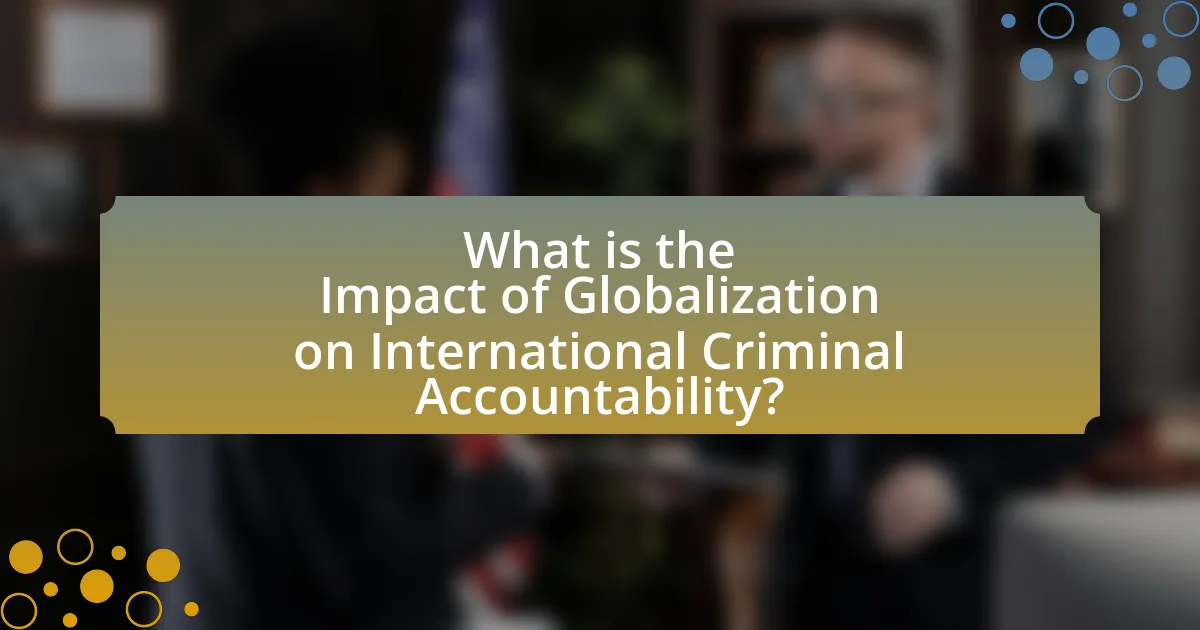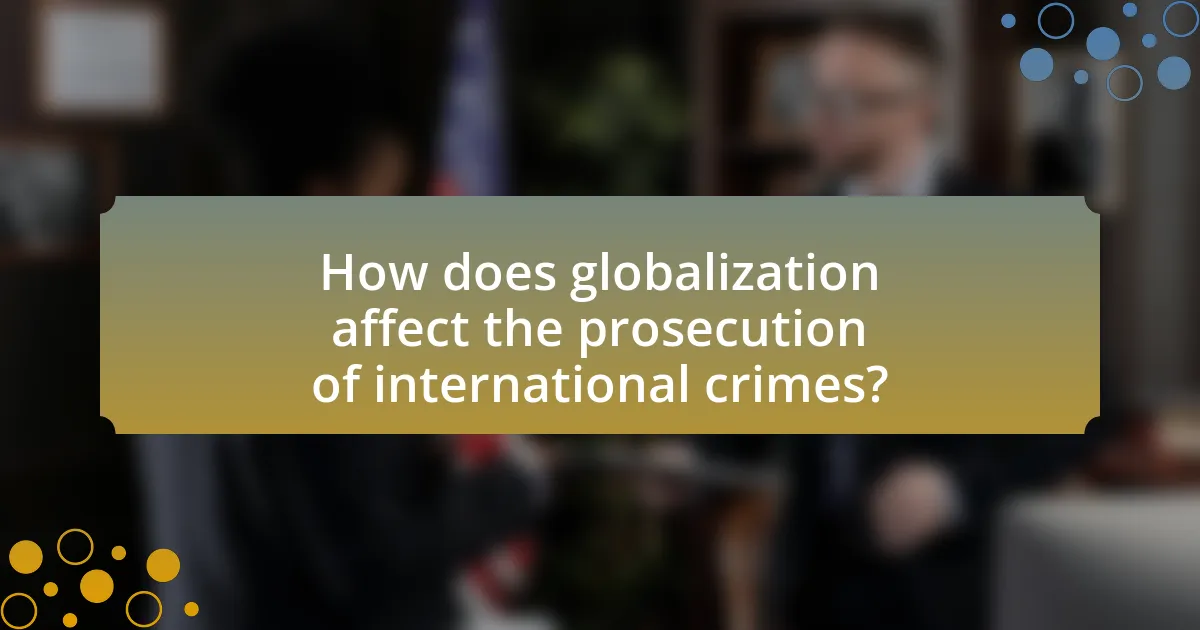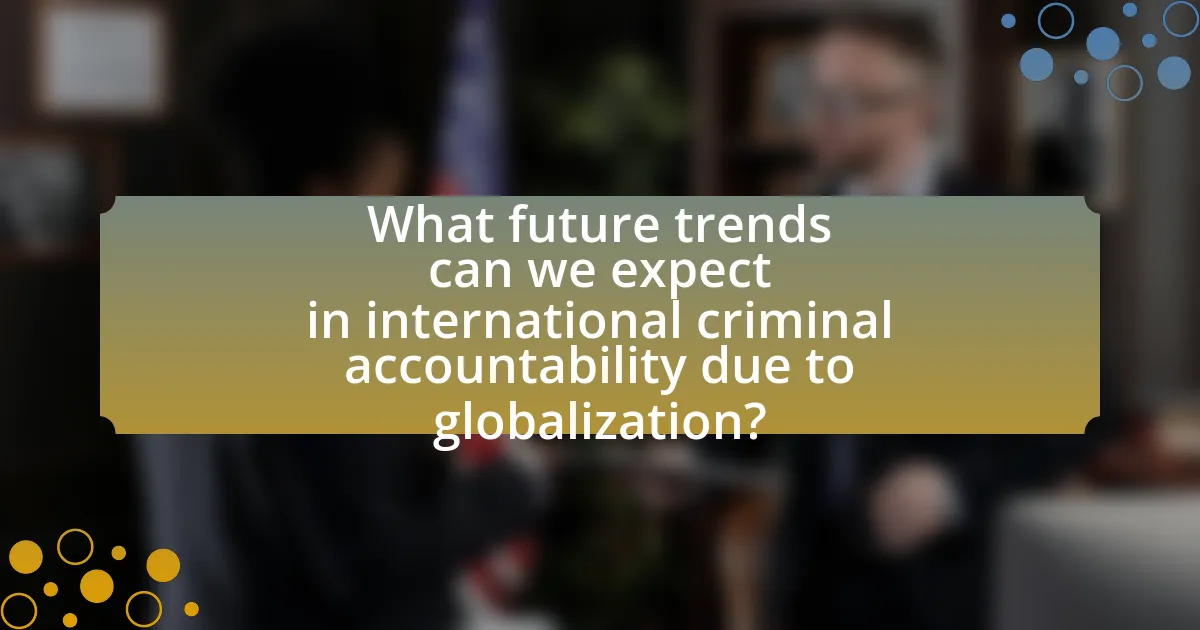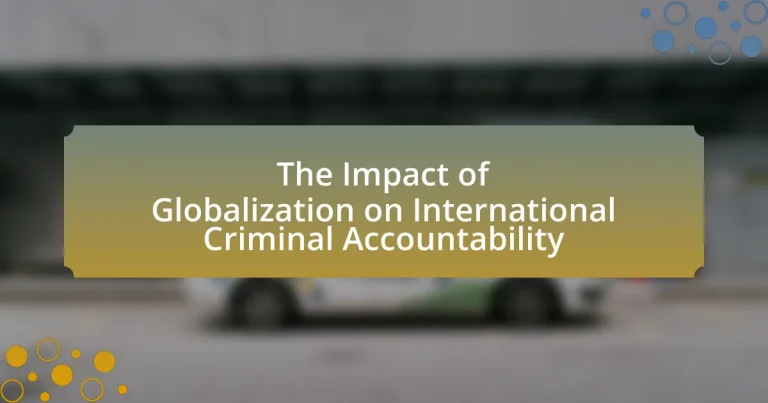The article examines the impact of globalization on international criminal accountability, highlighting how increased interconnectedness among states and organizations enhances cooperation in prosecuting transnational crimes. It discusses the establishment of international legal frameworks, such as the International Criminal Court, and the role of treaties in addressing global criminality. Key components affected by globalization include the principle of universal jurisdiction and the challenges posed by differing national laws and political influences. The article also explores how technological advancements and collaborative efforts among nations can improve accountability measures and support victims of international crimes.

What is the Impact of Globalization on International Criminal Accountability?
Globalization significantly enhances international criminal accountability by facilitating cooperation among states and international organizations in prosecuting transnational crimes. This interconnectedness allows for the sharing of intelligence, resources, and legal frameworks, which strengthens the enforcement of international law. For instance, the establishment of the International Criminal Court (ICC) in 2002 exemplifies how globalization has led to a unified approach in addressing crimes such as genocide and war crimes, enabling states to hold individuals accountable regardless of where the crimes were committed. Furthermore, the rise of global civil society and non-governmental organizations has increased pressure on governments to comply with international standards, thereby promoting accountability on a broader scale.
How has globalization influenced the framework of international criminal law?
Globalization has significantly influenced the framework of international criminal law by facilitating the establishment of transnational legal norms and institutions. This influence is evident in the creation of international tribunals, such as the International Criminal Court (ICC), which emerged from the need for a unified legal response to crimes that transcend national borders, including genocide and war crimes. The proliferation of international treaties and conventions, such as the Rome Statute, reflects a collective effort among states to address global criminality collaboratively. Furthermore, globalization has enhanced cooperation among nations through mutual legal assistance treaties, enabling the sharing of evidence and resources in prosecuting international crimes. This interconnectedness underscores the shift from a purely national approach to a more integrated international legal framework, driven by the recognition that crimes against humanity require a global response.
What are the key components of international criminal law affected by globalization?
The key components of international criminal law affected by globalization include the establishment of international tribunals, the principle of universal jurisdiction, and the enhancement of cooperation among states. International tribunals, such as the International Criminal Court (ICC), have been created to prosecute individuals for crimes like genocide and war crimes, reflecting a global commitment to accountability. The principle of universal jurisdiction allows states to prosecute serious crimes regardless of where they occurred, promoting a collective response to international crimes. Additionally, globalization has facilitated greater collaboration among nations through treaties and agreements, improving the enforcement of international law and the prosecution of offenders. These components demonstrate how globalization has reshaped the landscape of international criminal law, emphasizing accountability on a global scale.
How do international treaties adapt to the challenges posed by globalization?
International treaties adapt to the challenges posed by globalization by incorporating flexible frameworks that address transnational issues, enhancing cooperation among states, and establishing mechanisms for enforcement and compliance. For instance, treaties like the United Nations Convention against Transnational Organized Crime facilitate collaboration across borders by allowing countries to share information and resources effectively. Additionally, treaties often include provisions for updating and amending terms to respond to emerging global threats, such as cybercrime and human trafficking, which have escalated due to globalization. This adaptability is crucial for maintaining international criminal accountability in a rapidly changing global landscape.
What role do international organizations play in enhancing accountability?
International organizations play a crucial role in enhancing accountability by establishing legal frameworks, monitoring compliance, and facilitating cooperation among states. These organizations, such as the United Nations and the International Criminal Court, create treaties and conventions that define accountability standards, such as the Rome Statute, which outlines the prosecution of war crimes and crimes against humanity. Furthermore, they conduct investigations and provide platforms for reporting violations, thereby increasing transparency and pressure on states to adhere to international norms. For instance, the UN’s Human Rights Council regularly reviews member states’ human rights records, holding them accountable for their actions. This multifaceted approach ensures that accountability is not only a legal obligation but also a moral imperative recognized globally.
How do organizations like the ICC address crimes in a globalized context?
Organizations like the International Criminal Court (ICC) address crimes in a globalized context by establishing a legal framework that transcends national boundaries, enabling the prosecution of individuals for serious international crimes such as genocide, war crimes, and crimes against humanity. The ICC operates under the Rome Statute, which was adopted in 1998 and came into force in 2002, allowing it to hold accountable those responsible for egregious offenses regardless of where they occur. This framework is essential in a globalized world where crimes can have transnational implications, as seen in conflicts that involve multiple countries or international actors. The ICC collaborates with national jurisdictions and international organizations to gather evidence, facilitate arrests, and ensure that justice is served, thereby reinforcing the principle of accountability on a global scale.
What mechanisms do these organizations use to enforce accountability across borders?
Organizations enforce accountability across borders primarily through international treaties, legal frameworks, and collaborative mechanisms. For instance, the International Criminal Court (ICC) operates under the Rome Statute, which allows for the prosecution of individuals for crimes such as genocide and war crimes, regardless of where they occur. Additionally, mutual legal assistance treaties (MLATs) facilitate cooperation between countries in criminal matters, enabling the sharing of evidence and extradition of suspects. Furthermore, organizations like Interpol provide a platform for international police cooperation, issuing notices to alert member countries about wanted individuals. These mechanisms collectively enhance the ability to hold perpetrators accountable, demonstrating the effectiveness of international collaboration in addressing transnational crimes.
What challenges does globalization pose to international criminal accountability?
Globalization poses significant challenges to international criminal accountability by complicating jurisdiction and enforcement mechanisms. The interconnectedness of nations often leads to difficulties in prosecuting crimes that cross borders, as different legal systems may have varying definitions of criminal behavior. For instance, transnational crimes such as human trafficking and cybercrime require cooperation among states, which can be hindered by differing laws and political interests. Additionally, globalization can facilitate impunity, as perpetrators may exploit weak legal frameworks in certain countries to evade justice. The International Criminal Court (ICC) faces obstacles in enforcing its rulings due to state sovereignty and the reluctance of nations to extradite suspects. These factors collectively undermine the effectiveness of international legal frameworks designed to hold individuals accountable for serious crimes.
How do differing national laws complicate international accountability?
Differing national laws complicate international accountability by creating legal inconsistencies that hinder cooperation among states. Each country has its own legal framework, which can lead to conflicting definitions of crimes, varying standards of evidence, and different procedures for prosecution. For instance, while one nation may classify certain acts as war crimes, another may not recognize them as such, resulting in challenges for international tribunals seeking to hold individuals accountable. This legal fragmentation can obstruct extradition processes and limit the enforcement of international treaties, as seen in cases like the International Criminal Court’s difficulties in prosecuting individuals from countries that do not recognize its jurisdiction.
What impact does political influence have on prosecuting international crimes?
Political influence significantly hampers the prosecution of international crimes by creating barriers to accountability and undermining judicial independence. For instance, powerful nations may exert pressure on international courts or tribunals to dismiss cases or protect individuals from prosecution, as seen in instances where political allies of state leaders evade justice due to diplomatic immunity or political negotiations. This influence can lead to selective enforcement of international law, where only certain crimes are prosecuted based on political convenience rather than the severity of the offenses. Historical examples include the reluctance of the United States to support the International Criminal Court’s investigations into war crimes, which illustrates how political considerations can obstruct the pursuit of justice for international crimes.

How does globalization affect the prosecution of international crimes?
Globalization enhances the prosecution of international crimes by facilitating cooperation among nations, improving access to information, and promoting the establishment of international legal frameworks. The interconnectedness of countries allows for the sharing of intelligence and resources, which is crucial in investigating and prosecuting transnational crimes such as human trafficking and terrorism. For instance, the establishment of the International Criminal Court (ICC) in 2002 exemplifies how globalization has led to a unified approach in holding individuals accountable for crimes against humanity, war crimes, and genocide. Furthermore, treaties like the United Nations Convention against Transnational Organized Crime illustrate how global collaboration can strengthen legal mechanisms and enforcement capabilities, thereby increasing the effectiveness of prosecutions across borders.
What are the implications of transnational crime in a globalized world?
Transnational crime in a globalized world undermines national sovereignty, facilitates the spread of illicit activities, and exacerbates global security threats. The interconnectedness of economies and societies allows criminal organizations to operate across borders with greater ease, leading to increased drug trafficking, human trafficking, and cybercrime. For instance, the United Nations Office on Drugs and Crime reported that the global drug trade generates an estimated $320 billion annually, highlighting the scale of the issue. Additionally, transnational crime poses challenges for law enforcement, as jurisdictions may lack the legal frameworks or resources to effectively combat these crimes, resulting in a fragmented response to global criminal networks.
How do networks of organized crime exploit globalization?
Networks of organized crime exploit globalization by leveraging increased connectivity and reduced barriers to trade and communication to expand their operations across borders. These networks utilize global supply chains to traffic drugs, weapons, and humans, taking advantage of the anonymity provided by international shipping and digital transactions. For instance, the United Nations Office on Drugs and Crime reported that drug trafficking has become a transnational issue, with criminal organizations operating in multiple countries to maximize profits and evade law enforcement. Additionally, globalization facilitates money laundering through complex financial systems, allowing illicit gains to be integrated into the legitimate economy. This exploitation of globalization not only enhances the reach and efficiency of organized crime but also complicates international efforts to hold these networks accountable.
What strategies are being implemented to combat transnational crime?
Governments and international organizations are implementing various strategies to combat transnational crime, including enhanced international cooperation, intelligence sharing, and the establishment of specialized task forces. For instance, the United Nations Office on Drugs and Crime (UNODC) promotes collaborative frameworks among member states to address issues like drug trafficking and human smuggling. Additionally, initiatives such as the Financial Action Task Force (FATF) focus on combating money laundering and terrorist financing through standardized regulations and assessments. These strategies are supported by data indicating that transnational crime costs the global economy over $1.6 trillion annually, highlighting the urgent need for effective measures.
How does globalization impact victims of international crimes?
Globalization significantly impacts victims of international crimes by facilitating the transnational nature of these crimes, which often leaves victims without adequate legal recourse. As international borders become less relevant, perpetrators can exploit jurisdictions with weaker legal frameworks, making it difficult for victims to seek justice. For instance, human trafficking, a crime exacerbated by globalization, affects millions globally, with the International Labour Organization estimating that 24.9 million people are trapped in forced labor, highlighting the scale of victimization. Furthermore, globalization can hinder the ability of victims to access support services, as resources may be concentrated in wealthier nations, leaving those in affected regions without necessary aid.
What challenges do victims face in seeking justice across borders?
Victims face significant challenges in seeking justice across borders, primarily due to legal jurisdiction issues, varying legal standards, and lack of cooperation between countries. Legal jurisdiction can complicate cases, as different nations may have different laws regarding the prosecution of crimes, leading to difficulties in determining which country has the authority to hear a case. Additionally, varying legal standards can result in disparities in how crimes are defined and punished, making it harder for victims to achieve consistent outcomes. Furthermore, the lack of cooperation between countries can hinder the gathering of evidence and the extradition of suspects, as seen in cases involving human trafficking and transnational crimes, where victims often struggle to navigate complex international legal frameworks.
How can globalization facilitate support for victims of international crimes?
Globalization can facilitate support for victims of international crimes by enhancing international cooperation and resource sharing among nations and organizations. This interconnectedness allows for the establishment of global legal frameworks, such as the International Criminal Court, which provides mechanisms for victims to seek justice and reparations. Furthermore, globalization promotes awareness and advocacy through international media and non-governmental organizations, which can mobilize resources and support for victims. For instance, the United Nations has implemented various initiatives aimed at providing assistance to victims of war crimes and crimes against humanity, demonstrating how global collaboration can lead to tangible support for affected individuals.

What future trends can we expect in international criminal accountability due to globalization?
Future trends in international criminal accountability due to globalization include increased cooperation among states, the rise of transnational legal frameworks, and enhanced use of technology for monitoring and enforcement. As globalization fosters interconnectedness, countries are more likely to collaborate on legal matters, leading to the establishment of treaties and agreements that facilitate extradition and prosecution of international crimes. For instance, the International Criminal Court (ICC) has seen a growing number of member states, which reflects a collective commitment to accountability. Furthermore, advancements in technology, such as digital evidence collection and data sharing, are expected to streamline investigations and prosecutions across borders, making it easier to hold perpetrators accountable. These trends indicate a shift towards a more unified and effective approach to international criminal justice in response to the challenges posed by globalization.
How might technological advancements influence accountability measures?
Technological advancements significantly enhance accountability measures by enabling real-time monitoring and data collection. For instance, the use of blockchain technology ensures transparent and tamper-proof records of transactions, which can be crucial in tracking financial crimes and ensuring compliance with international laws. Additionally, advancements in artificial intelligence facilitate the analysis of large datasets to identify patterns of misconduct, thereby improving the detection of fraudulent activities. A study by the World Economic Forum highlights that technologies like big data analytics can increase the efficiency of accountability systems by up to 30%, demonstrating their potential to transform how accountability is enforced on a global scale.
What role does digital evidence play in prosecuting international crimes?
Digital evidence plays a crucial role in prosecuting international crimes by providing verifiable and objective information that can substantiate claims of criminal activity. This type of evidence includes data from social media, emails, and other digital communications, which can establish timelines, identify perpetrators, and corroborate witness testimonies. For instance, the International Criminal Court has utilized digital evidence in cases such as the prosecution of former Congolese warlord Bosco Ntaganda, where social media posts and mobile phone records were instrumental in linking him to war crimes. The increasing prevalence of digital technology in global communication enhances the ability of legal authorities to gather and analyze evidence, thereby strengthening the prosecution’s case in international criminal tribunals.
How can technology improve collaboration among international legal bodies?
Technology can improve collaboration among international legal bodies by facilitating real-time communication and data sharing. Tools such as secure online platforms enable legal professionals from different jurisdictions to exchange information swiftly, enhancing the efficiency of investigations and legal proceedings. For instance, the use of blockchain technology can ensure the integrity and traceability of shared evidence, while video conferencing tools allow for immediate consultations and hearings, reducing delays caused by geographical barriers. Additionally, centralized databases can provide access to legal documents and case law across borders, streamlining the legal process and fostering a more cohesive approach to international law enforcement.
What best practices can enhance international criminal accountability in a globalized context?
Best practices that can enhance international criminal accountability in a globalized context include strengthening international legal frameworks, fostering cooperation among states, and utilizing technology for evidence collection and sharing. Strengthening international legal frameworks, such as the Rome Statute of the International Criminal Court, provides a solid foundation for prosecuting war crimes and crimes against humanity. Cooperation among states is essential, as evidenced by the success of joint investigations and extradition treaties, which facilitate the apprehension of fugitives across borders. Additionally, leveraging technology, such as digital forensics and blockchain for evidence integrity, enhances the ability to gather and preserve crucial evidence, thereby supporting accountability efforts. These practices collectively contribute to a more effective international response to crimes that transcend national boundaries.
How can countries strengthen their legal frameworks to support international accountability?
Countries can strengthen their legal frameworks to support international accountability by adopting comprehensive legislation that aligns with international treaties and standards. This includes ratifying key agreements such as the Rome Statute of the International Criminal Court, which establishes a legal basis for prosecuting war crimes, genocide, and crimes against humanity. Additionally, countries should implement domestic laws that facilitate cooperation with international judicial bodies, including provisions for extradition and mutual legal assistance.
For instance, the establishment of specialized courts or tribunals can enhance the capacity to address international crimes effectively. Furthermore, training law enforcement and judicial personnel on international law and human rights standards is essential for ensuring proper enforcement and adherence to these frameworks. Countries that have successfully integrated these measures, such as Germany and the Netherlands, demonstrate the effectiveness of robust legal frameworks in promoting accountability on an international scale.
What collaborative efforts are essential for effective prosecution of international crimes?
Effective prosecution of international crimes requires collaborative efforts among states, international organizations, and non-governmental organizations. These collaborations facilitate information sharing, joint investigations, and the establishment of legal frameworks that support accountability. For instance, the International Criminal Court (ICC) relies on cooperation from member states to arrest suspects and gather evidence, as seen in cases like the prosecution of former Sudanese President Omar al-Bashir, where multiple countries were involved in his indictment and pursuit. Additionally, initiatives such as the United Nations’ Global Initiative to Combat Human Trafficking exemplify how international cooperation can enhance the prosecution of transnational crimes by uniting resources and expertise across borders.


